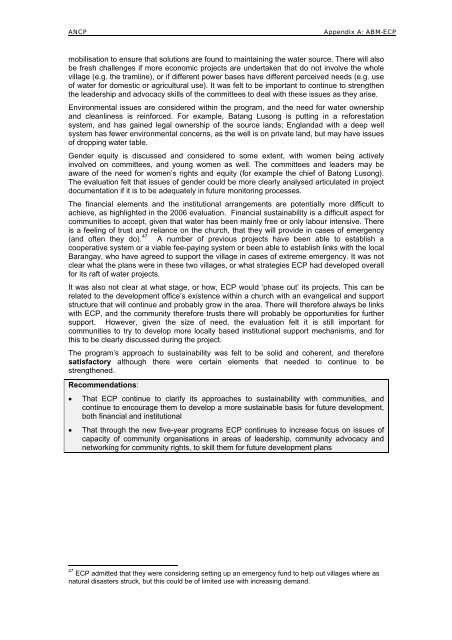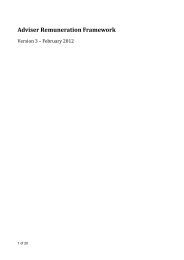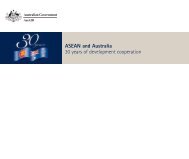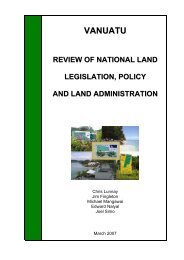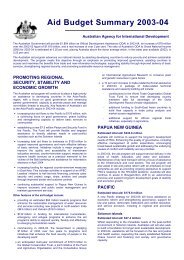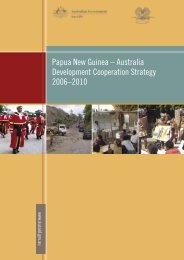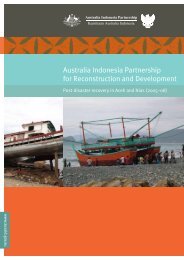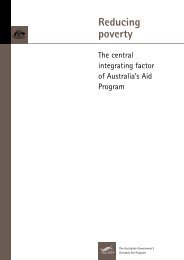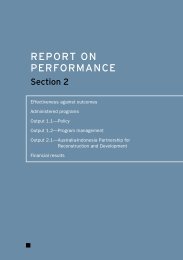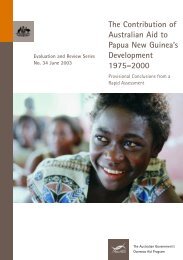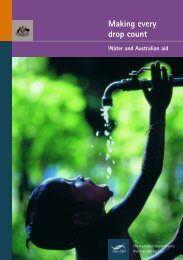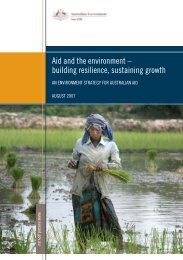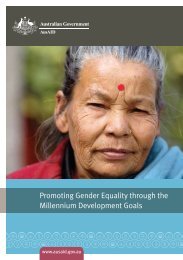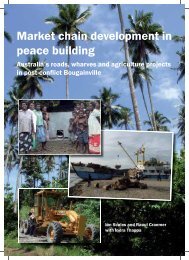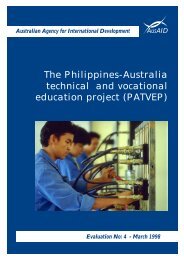ANCP Philippines Cluster Evaluation Report - AusAID
ANCP Philippines Cluster Evaluation Report - AusAID
ANCP Philippines Cluster Evaluation Report - AusAID
Create successful ePaper yourself
Turn your PDF publications into a flip-book with our unique Google optimized e-Paper software.
<strong>ANCP</strong>Appendix A: ABM-ECPmobilisation to ensure that solutions are found to maintaining the water source. There will alsobe fresh challenges if more economic projects are undertaken that do not involve the wholevillage (e.g. the tramline), or if different power bases have different perceived needs (e.g. useof water for domestic or agricultural use). It was felt to be important to continue to strengthenthe leadership and advocacy skills of the committees to deal with these issues as they arise.Environmental issues are considered within the program, and the need for water ownershipand cleanliness is reinforced. For example, Batang Lusong is putting in a reforestationsystem, and has gained legal ownership of the source lands; Englandad with a deep wellsystem has fewer environmental concerns, as the well is on private land, but may have issuesof dropping water table.Gender equity is discussed and considered to some extent, with women being activelyinvolved on committees, and young women as well. The committees and leaders may beaware of the need for women’s rights and equity (for example the chief of Batong Lusong).The evaluation felt that issues of gender could be more clearly analysed articulated in projectdocumentation if it is to be adequately in future monitoring processes.The financial elements and the institutional arrangements are potentially more difficult toachieve, as highlighted in the 2006 evaluation. Financial sustainability is a difficult aspect forcommunities to accept, given that water has been mainly free or only labour intensive. Thereis a feeling of trust and reliance on the church, that they will provide in cases of emergency(and often they do). 47 A number of previous projects have been able to establish acooperative system or a viable fee-paying system or been able to establish links with the localBarangay, who have agreed to support the village in cases of extreme emergency. It was notclear what the plans were in these two villages, or what strategies ECP had developed overallfor its raft of water projects.It was also not clear at what stage, or how, ECP would ‘phase out’ its projects. This can berelated to the development office’s existence within a church with an evangelical and supportstructure that will continue and probably grow in the area. There will therefore always be linkswith ECP, and the community therefore trusts there will probably be opportunities for furthersupport. However, given the size of need, the evaluation felt it is still important forcommunities to try to develop more locally based institutional support mechanisms, and forthis to be clearly discussed during the project.The program’s approach to sustainability was felt to be solid and coherent, and thereforesatisfactory although there were certain elements that needed to continue to bestrengthened.Recommendations:• That ECP continue to clarify its approaches to sustainability with communities, andcontinue to encourage them to develop a more sustainable basis for future development,both financial and institutional• That through the new five-year programs ECP continues to increase focus on issues ofcapacity of community organisations in areas of leadership, community advocacy andnetworking for community rights, to skill them for future development plans47 ECP admitted that they were considering setting up an emergency fund to help out villages where asnatural disasters struck, but this could be of limited use with increasing demand.<strong>ANCP</strong> <strong>Philippines</strong> <strong>Cluster</strong> <strong>Evaluation</strong> <strong>Report</strong> (ver. 2.0)XI


